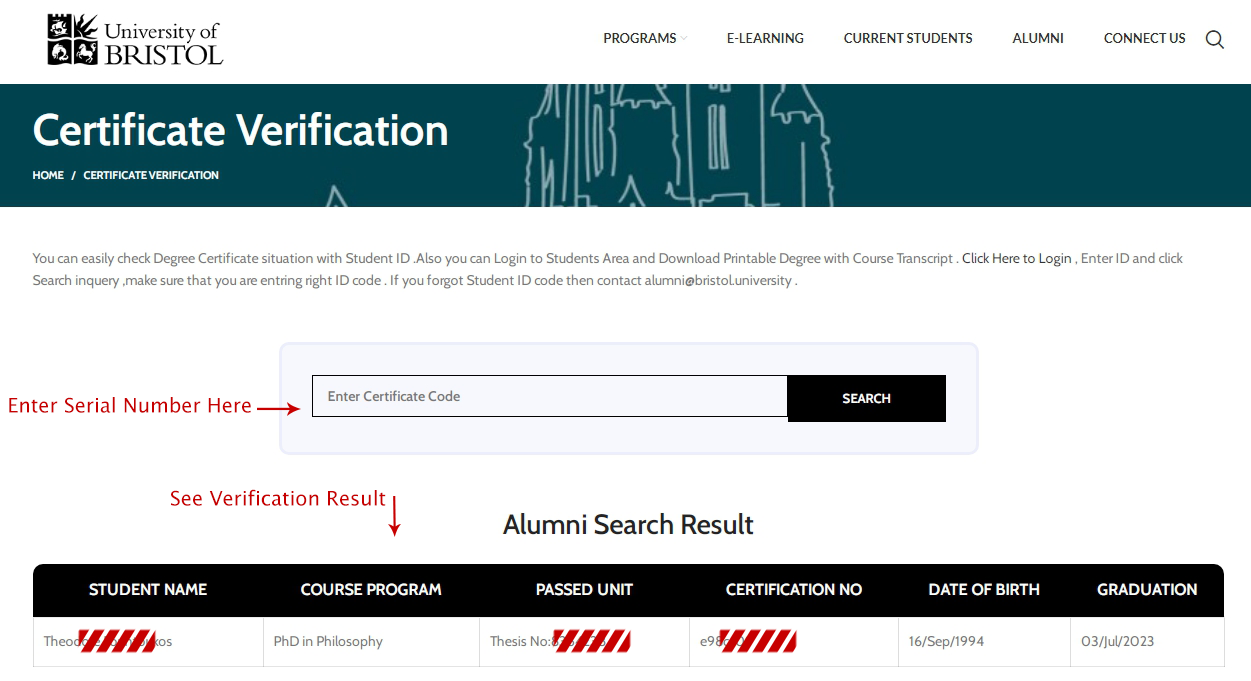We will give you all verified degree’s document with registered number for verifying on university website.
As online degree offerings become more popular in world, it’s important to make sure you are enrolling in an accredited and recognised degree programme. Otherwise, you risk spending time and money on a degree that a future employer might not accept as part of your necessary qualifications, education, or experience. Read more to learn why online degree verification is important, how to check online degree verification in world, and potential red flags to watch for so you know if an online degree course is legitimate.

What is online degree verification?
Online degree verification happens when a potential employer looks up your degree in a database, such as DirectVerify, to make sure your degree is legitimate and earned from an accredited or recognised university. Students in world can study online or remotely at universities around the world, and many take advantage of these degrees to develop key skills and position themselves competitively in the workforce. Because of the vast number of colleges online that may or may not be legitimate, employers submit your degree or transcripts to be checked and verified against the school’s records.
Why is online degree verification important?
Online degree verification is necessary because it helps employers ensure the candidates they hire have the skills and background to meet their role’s expectations. However, online degrees sometimes risk being scammed or being faked by companies known as “diploma mills.” In addition, some candidates may fake their credentials, claiming they earned a degree from an institution when they did not. Online degree verification double-checks degrees to ensure the employee legitimately gained their degree.
How to verify online degrees in world
To verify online degrees in world, employers run a background check on potential hires or employees who want to provide verified educational materials and submit their transcripts to verification databases, such as DirectVerify or Knowy. Then, staff at these companies search publicly available records about a university and its students or contact the university to use their verification methods. Once a degree is verified, the employer or employee receives a verification certificate.
Benefits and drawbacks of an online degree
Online degrees offer several benefits to students looking to advance their education. One benefit is the cost. Online degrees are generally more affordable than in-person degrees, and many students can choose a degree programme that fits their lifestyle and budget. Plus, the flexibility of online degrees means that students can learn at high-quality universities on schedules that work with their lives.
The biggest drawback of online degrees is the risk of that degree being a scam. Some online universities are fake and take students’ money without ever intending to provide them with a degree. Some fake colleges, or diploma mills, give a degree without the student ever taking a course.
Online degree red flags
When choosing an online degree, it’s important to look out for red flags that might point to a scam. Researching the university before enrolling helps protect you, your information, and your money. Some red flags to look for include the following:
Pressure to enroll in the course
Online courses that use web copy or marketing to make you feel like you must enroll immediately are causes for concern. Some examples are if the site tells you that space is extremely limited, or the deadline is only hours or days away. This tone might make you feel like you’ll miss out if you don’t sign up right then and there, but that’s the issue: a real university wouldn’t rush you to enroll. You want to pick a degree at a university that allows you time to decide.
Tuition due before acceptance
Online universities that require you to pay your tuition up front—sometimes before you’ve even enrolled or been accepted into the course—are a cause for concern. Legitimate universities typically offer payment plans that allow you to spread out your payments over the programme’s life. These fake universities often hide their fee structure, making it difficult to see what your money is paying for. Transparent fee structures and payment schedules are signs of a legitimate university.
Institution names that copy famous universities
Some scam universities fashion their names to sound similar to legitimate, established universities, confusing students looking for an actual degree. For example, a fake online college might have the name Delhi Technological Online University, which isn’t real but sounds like it’s associated with the University of Delhi. To check if a college is accurate, you’ll want to look it up on either the National Academic Depository or the University Grant Commission’s website.
Minimal admission criteria
If the online university has little to no admission criteria, you’ll want to check to make sure it’s a legitimate institution. Most colleges require at least an application that includes your previous educational history and a letter or essay. If enrollment is as simple as plugging in your name and email address, there’s a chance the college or university is a scam.
No clear contact information
If you can’t find an online university’s contact information, including a phone number, email, or street or mailing address, there’s a chance it’s not a real university. You should be able to contact administrative services, your teachers, and other student resources. It’s a red flag if you can’t contact any staff.
No accreditation status
All legitimate universities hold accreditation, meaning their courses are held to a high-quality standard. Many employers only accept degrees from accredited schools, so it’s important to ensure you attend an institution with accreditation. The best way to learn if an online course holds accreditation is to research it through legitimate databases like the National Academic Depository. Accredited schools often display their accreditation on their website, as well.
